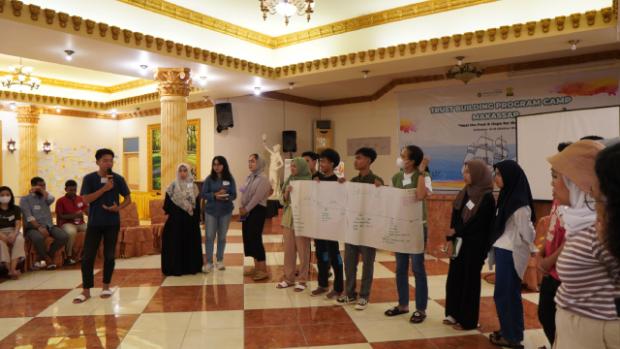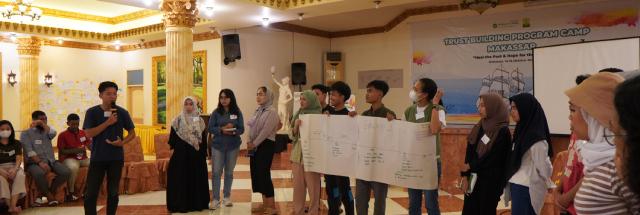
Trustbuilding Program Camp Makassar that was initiated by Initiative of Change has been held from 14 to 16 October 2022 at Galesong beach with a main theme “heal the past and hope for the future”. Makassar has been chosen as one of the 5 big cities where Trustbuilding Program Camp Indonesia will take place. Besides some extremist and conflict issues that arise, Makassar is also a place where many youth from eastern part of Indonesia come to take their study. This creates many interactions between youth from different backgrounds.
South Sulawesi are mostly known for their skills as sailors and their rigging system: Pinisi. Using this, the committee of Trustbuilding Program had designed the program as if the participants were coming to sail together. Right after the participants were accepted, the committee prepared a welcome meeting to know them and to equip them before they are ready to sail.
Just as a ship with a pinisi rigging system has 7 to 8 sails on two masts, the Makassar Trustbuilding program also has 8 main activities carried out by two organizations, namely the Initiative of Change (IofC) in collaboration with MIPG (Mahabbah Institute for Peace and Goodness). Each sail that is developed is a joint effort involving the committee, trainers and participants to prepare themselves to sail the rapid flow of polarity and division in Indonesia.
Let's follow what kind of sails were developed by these two organizations of approximately 70 people who participated in the Trustbuilding Program Camp Makassar.
First sail: The meeting
The meeting with the Makassar MIPG team began 7 years ago when the IofC team held the first Trustbuilding camp, the good energy given was enthusiastically welcomed so that the MIPG team was formed and produced various peace camps on the island of Sulawesi. This second meeting again brings together the good energy that was depicted from the meeting of participants from various communities and backgrounds during the camp that was so passionate. They open their hearts to accept and actively participate in every session.
The support from a prominent Muslim Scholar Prof. Dr. H. Muhammad Galib Mattola., M.A, Secretary of Ulama Council of South Sulawesi and Director of Post Graduate of State Islamic University Alaudin Makassar also added to the firmness of this first sail that was developed. He said that meeting in safe spaces like this is what communities in Indonesia need that are not tied to various political interests or agendas.
Second sail: Family group
The second sail that expands that will help solidify each ship's journey is the presence of a safe space to share and listen. When everyone knows themselves by studying their relationships with those closest to them. The groups formed are facilitated so that everyone is listened to, accepted without judgment, or labeling, or giving advice, or abandonment. Story after story is told, slowly the more this second sail expands, slowly collapsing the walls of prejudice. Everyone has a story and it's worth listening to.
Third Sail: Quiet Time
Developing this third sail begins every morning and is a method that enables people to transform wounds into strength and hope. Quiet time is not only a method of reflection but is a power to connect with the self (connection), correct one self (correction), and self-direction (direction), which then leads to real actions. Each form of reflection must be filtered with 4 moral values, namely honesty, purity, selflessness, and love. It is the handrail that leads us to sail in this life and let go of the wounds of the past.
During 3 days, the participants experienced Quiet time. It starts with pouring out the chatterbox inside the head, then on the second day each participant re-examines their self-identity and finds themselves behind layers of outer identity. After that on the third day, participants found wound buttons that consumed their energy and prevented them from relating to others. Each Quiet Time session is followed by sharing with each other.
Forth sail: Healing historical wound
"Wounds that are not recognized and healed, will be transformed into new wounds in the future."
This sail is a sail developed with nuances of emotion. It starts with allowing oneself to go back decades, finding the wound points of interfaith or denominational conflict and seeing them as a series of timelines that shape the youth of today with all their wounded heritage. The historical wounds will never recover if they are not truly recognized. Thus the fourth sail can only be developed with the recognition that both Muslims and Christians, have been both perpetrators and victims in the wound point of conflict in the timeline that has been created.
In silence, each participant stepped up and pondered what happened and what could be done going forward. What kind of wounds are passed on to me? Questions and discussions led to the fifth sail.
Fifth sail: Honest conversation
An honest and safe conversation. Every prejudice is broken, the wall of distrust is torn down. There is a recognition from each side that everyone, every religion takes on a role that causes conflict, either directly or indirectly, either through prejudice or action. The apologies conveyed, the hugs given, give hope that we are creating a new narrative that brings recovery and peace instead of passing on old wounds to the next generation.
Honest conversation and defusing the dilemma also appears on this sail. Everyone finds relief in sharing the dilemmas in their lives and learning to be a sincere listener that listens without rebutting or judging.
Sixth sail, tools: Friends For Life cards and Pest Attack board games
There is a new color on the sixth sail that strengthens the pinisi system this time. When participants share through Friends for Life cards and play Pest Attack board game. Each sharing of the game's stories and strategies, exchanging laughter and doubt, becomes bricks arranged one by one to build trust in each other through games and cards.
Seventh sail, Expression night
The sail of culture can never be missed in sailing life in Indonesia. Each participant showed their love through traditional performances and costumes. There's laughter, there's pride, and there's certainly a sense of intertwining, reinforcing the trust that has been formed over the past two days.
Eighth sail, plan the action
If it can be colored, this sail is a full-color sail. How each participant with different backgrounds, different colors, can build trust in each other. Every planning has been taken and concrete action is recorded with the belief that when they return to their respective communities, they see other people that are different from them with new perspectives, and it's time for them to step up with a new point of view, a broader one and with a new narrative, a narrative of peace.
And every one of those pinisi ships sailed....
Each sail that expands is not only about a world issue, a country issue but also a personal issue. The program has touched right on the niches of each participant's heart. Not only those 50 pinisi ships are learning with new colors. 10 facilitators, 5 committees, and 4 trainers are sailing too and bring enthusiasm, and of course much greater hope for Indonesia which is “bhinneka tunggal ika'.
Some participants shared their experiences and feelings during and after the program, some of them found support systems here, “I feel relieved because there are some things that I’ve kept deep inside myself for so long. Finally I can let them out to my groups, they gave me lots of support and this program has taught me to love myself and be myself. and of course I learn to be open a little more. I have met friends here that are willing to listen to my stories.”
Some of them decide to create something to give more impact to the world, “My target is to make a podcast about mental health”. Or decide to work on as a peacemaker, “My target is to share about peace to people that are interested in interfaith peace.”
Some of them are finally free from fear, “After following this program, finally I feel free from fear caused by negative stigma toward people that are different from me in religion, tribe, culture.”
These small findings have led the participants to take action as a group. They have planned to meet routinely and have quiet time sessions, to write down their story of change, and visit churches and mosques.
Just as our ancestors were so brave to sail the vast ocean, South Sulawesi’s people are also brave enough to take determination, to influence Indonesia's oceans full of polarity and division, transmit the spirit of peace and build trust in each other.
Author
Rinni Meir Rakmeni, Principal of SR

